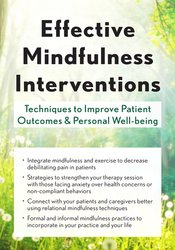

Your work as a therapist can be so rewarding, seeing patients return to their normal lives and activity. Yet, there are days when you’re not as locked in to each patient, where the emotional toll of their behaviour can hinder your progress and your go-to strategies just aren’t as effective.
Revitalize your practice and take your clinical effectiveness as a therapist to the next level using mindfulness.
Mindfulness isn’t a buzzword; the principles and practices are proven to work! Learn to use these time-tested techniques to improve therapy outcomes while simultaneously reducing the overwhelming stress you face daily as a healthcare professional.
Gain effective clinical techniques from physical therapist and certified mindfulness facilitator, Clyde Boiston, who has utilized mindfulness in his clinical practice for over two decades.
You’ll become proficient at applying foundational mindfulness techniques and practices to a variety of clinical populations – simultaneously improving your assessment of and treatment outcomes with patients.
Watch him in this transformational recording as he reveals the latest advances in mindfulness and neuroscience to improve your work as a therapist and open the door to becoming a more centred human being.
Full of experiential exercises, interactive discussions, and other resources, you will take away practical mindfulness strategies you can immediately integrate into your practice and your daily life.
| File type | File name | Number of pages | |
|---|---|---|---|
| Manual - Effective Mindfulness Interventions (1.50 MB) | 95 Pages | Available after Purchase | |
| Instructions for ASHA credit - Self-Study Only (64.4 KB) | Available after Purchase |
MASTER THE CORE SKILLS OF MINDFULNESS
Research and Treatment Concepts
MINDFULNESS STRATEGIES TO IMPROVE OUTCOMES
Mindfulness for Chronic Pain
MINDFULNESS STRATEGIES TO COMBAT STRESS AND BURNOUT
How to Start Your Own Personal Practice
Please wait ...